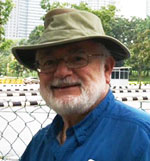“Homelands: A Personal History of Europe” by Timothy Garton Ash; Yale University Press, 2023.
By Oliver B. Pollak

RICHMOND, California — Academic Zoom presentations have created a common market for sharing scholarship and continuing education. The Woodrow Wilson Center and the American Historical Society present scholars and discussants with cutting edge ideas, interpretations, and revelations. Such was the presentation of Timothy Garton Ash, professor of European history at Oxford University, talking about his recent book Homelands: A Personal History of Europe (2023). The presentation was so compelling I ordered Homelands, it arrived the next day. Reading Homelands was a rewarding experience accompanied by smiles, tears and foreboding.
Professor Ash in an historian of the present. He periodizes the past as Post-War and Post-Wall and is open to a potential third epoch to accommodate Putin’s violation of the Ukraine’s sovereignty, Europe’s largest European war since 1945.
Ash, born in 1955 first visited Europe in 1969 as an English schoolboy. He fell in love with Europe’s kaleidotapestry and visited every year from age 18 in 1973 until Covid. He carried a notebook or journal to record his impressions, 50 years of notebooks, 50 years of Europe record the triumphs and travails of Freedom and Europe. The result, 44 brisk and vivid vignettes and cameos of oppressed refugees, migrants, guest workers, ‘ordinary people,’ leaders of aspiring political movements, presidents, prime ministers, and dictators.
Ash shares his observations, method and purpose of history as a “memory machine”: “A single personal encounter with a veteran or survivor can be life-changing. And then there is the work of historians, novelists, journalists and filmmakers, who try to bring alive the dead for the sake of the living,” a process that Auschwitz survivor Elie Wiesel called “a memory transfusion.”
Memoirs by historians may illuminate the sinews of the ever developing profession. As an almost octogenarian I have lived and witnessed much of what Ash records. There is an intellectual genealogy of mentor-student relationships. I was influenced during the mid-1960s by reading the liberal thinker Ralf Dahrendorf (1929-2009) about peaceful conflict resolution. He was jailed at the age of 15 and spent Christmas 1944 in a Gestapo prison camp for distributing anti-Nazi literature. No doubt Timothy’s father’s experience among the troops landing at Normandy on D-Day in 1944 provided historical context and influence. Dahrendorf served as Ash’s intellectual mentor and friend. “Freedom,” Ash claims, became his personal leitmotif. The intellectual genealogy continues to the third generation. Timothy Snyder (1969-) of Yale University was a doctoral student of Ash’s at Oxford. Snyder published Badlands, Stalin and Hitler in Europe in 2010.
During the late 1960s while reading Dahrendorf I also read An Introduction to Contemporary History (1964) by Geoffrey Barraclough (1908-1984).
Ash is an articulate proponent of freedom and democracy as the best means for political institutions to offer their citizens and guest workers, young and aged, healthcare, housing, education, and opportunity. An advocate for the European Union he was on the losing side as he rang door bells as an anti-Brexit influencer trying to change the minds of Eurosceptics.
 The documentation supporting this 363-page book is located on a website. His “A note from the author” on page 351, is actually an Acknowledgment. He writes, “Thank you for travelling this far with me. On www.timothygartonash.com I give my sources for all quotations in this book, apart from those that come from my own notebooks, as well as for many of the facts and figures.” The website contains a 10 minute video of Ash’s notebooks displayed on a staircase accompanied by his travel commentary.
The documentation supporting this 363-page book is located on a website. His “A note from the author” on page 351, is actually an Acknowledgment. He writes, “Thank you for travelling this far with me. On www.timothygartonash.com I give my sources for all quotations in this book, apart from those that come from my own notebooks, as well as for many of the facts and figures.” The website contains a 10 minute video of Ash’s notebooks displayed on a staircase accompanied by his travel commentary.
Stung by Bruce Chatwin and Moleskines my notebooks cover 1995 to 2023, pebbles compared to Ash’s boulder.
Then follows an “Index of people and places.” Thus Adolf Hitler is included but there is no entry for Holocaust, “anti-Semitism” or “Jews.” There are at least 21 unindexed references to Jews which I am happy to share with readers. Just email me. “Places” included Auschwitz and Bergen-Belsen. Peacemakers and dictators, Mikhail Gorbachev, Helmut Kohl, Vladimir Putin and Margaret Thatcher vie for the largest number of index entries.
Ash is a prolific influential journalist, public intellectual, consultant, historian, author of ten books including The File, based on his Stasi (East German Ministry of State Security, spy agency). The Stasi ceased operation in June 1990 after the Berlin Wall fell. Ash examined his file in the newly opened archives. I ordered Files.
The high points of the “upward turn” include the inspiration for “never again” – genocide and war – the borderless European Union of 27 member states, the reunification of the two Germanies, the role of Mikhail Gorbachev, and the dissolution of the Soviet Union with hopeful thoughts for its future. He reports many conversations with national and EU officials and counts his exchange with Vaclav Havel (1936-2011) as “one of the most memorable conversations of my life.”
When the Wall came down the liberal democratic West committed three sins: hubris, complacency and triumphalism, asserting that the future of history ran on the liberal and capitalist track without recognizing the depth of Russian resentment toward the West and the European Union aka the European Empire, albeit “the most reluctant empire in history.” (My mentor, John S. Galbraith (1916-2003), published Reluctant Empire: British Policy on the South African Frontier, 1834-54 in 1963, and guided my dissertation Empires in Collision: Anglo-Burmese Relations in the Mid-Nineteenth Century published in 1979). The villain in the story first appears in one of Ash’s 1994 notebooks which records impressions of meeting the KGB veteran deputy mayor of St Petersburg, Vladimir Putin, whom he identifies as a revanchist, and employing 20-20 hindsight, the post-Soviet perpetrator of a “fascist dictatorship.”
The low points came later, the unraveling of much liberal inspired social policy, the 2008 Great Recession financial crisis, the unresolved immigration crisis which fed populist politicians, discontent with foreigners and social policies favoring diversity and multiculturalism, the 2014 annexation of Crimea, Brexit, and the Russian February 24, 2022, invasion of Ukraine.
During the “downward turn,” peaceful conflict resolution may rely on “constructive pessimism” — “anticipate the worst, work for the best” and hope for a certain amount of “historical luck.”
Ash acknowledges George Orwell’s prescience. He recognizes Reagan’s “remarkable personal turn from confrontation to détente” combined with Gorbachev’s vision of a prosperous Soviet citizenry result in the “Upward turn.” “History, I believed, was still going our way.” The honeymoon did not last long and Ash marks 2005 as the turning point. The “dial began to turn towards a frontal confrontation between Putin’s Russia and the West.”
Ash was impressed with the 25-year old Hungarian reformer Victor Orban who he met in 1988. Yet 30 years later it “was profoundly depressing” as Hungary and Poland were leading “the charge away from democracy.”
A few days after the Ash Homeland tour de force Zoom program, the Wilson-AHA consortium treated viewers to Andrew I. Port of Wayne State University discussing his recent book Never Again, Germans and Genocide after the Holocaust (2023).
*
Oliver B. Pollak, Ph.D., J.D., professor emeritus of history at the University of Nebraska at Omaha, a lawyer and a member of the Institute for Historical Study, is a correspondent based in Richmond, California. He may be reached at oliver.pollak@sdjewishworld.com.